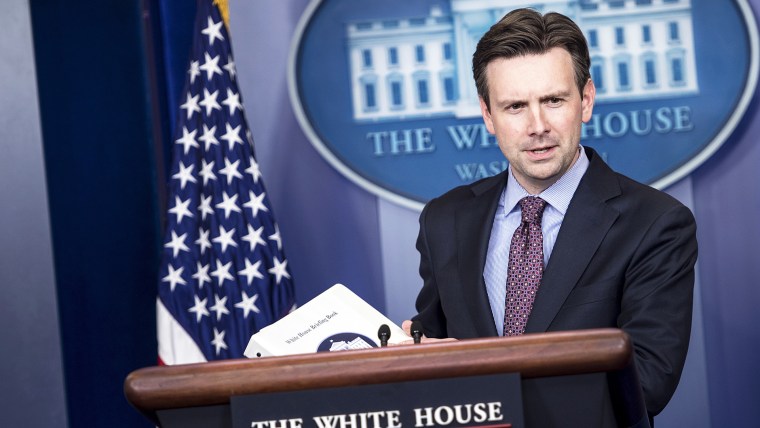In the immediate aftermath of last week's terrorist violence in Paris, several Republican senators were outraged ... that President Obama doesn't use the phrase "war on terror."
Sure, the Obama administration has been extremely aggressive in using force against terrorist targets, but as Senate Majority Whip John Cornyn (R-Texas) argued, proper conservative word choice is "the first step to actually dealing with [the security threat] on a realistic basis."
As it turns out, there's another phrase the right is demanding to hear. The conservative Washington Times reported this morning:
The White House tried to explain Tuesday why it has refused to use the term "radical Islam" in describing the Islamist terrorists responsible for last week's Paris attacks and other acts of violence across the globe. White House press secretary Josh Earnest said the administration doesn't want to legitimize those terrorists or the "warped" view of Islam they hold. Also, Mr. Earnest said, the phrase "radical Islam" simply is not an accurate way to describe the enemies of the U.S., France and other nations across the globe.
When Earnest told reporters this week about an upcoming summit to discuss strategies to combat violent extremists, Fox News' Ed Henry wanted to know, "Why isn't this summit on countering Islamic extremism?"
The White House press secretary explained, "Because violent extremism is something we want to be focused on, it is not just Islamic violent extremism that we want to counter. There are other forms." The Fox News correspondent wasn't satisfied, adding, "Paris, Australia, Canada. Isn't that violent Islamic extremism?"
Maybe a stroll down memory lane is in order.
In the not-too-distant past, the White House issued guidelines titled, "Words that Work and Words that Don't: A Guide for Counterterrorism Communication." The point was to urge officials to stop describing extremists as "jihadists" or "mujahedeen," and to drop "Islamo-fascism" altogether.
"It's not what you say but what they hear," the memo said in bold italic lettering.
The memo was distributed widely by federal agencies, including the State Department, the Department of Homeland Security, and the National Counter Terrorism Center, explaining to U.S. officials at every level that the rhetoric preferred by the right may undermine our foreign policy and national security interests.
A close adviser to the president conceded, "We ought to avoid the language of religion. Whenever they hear 'Islamic extremism, Islamic jihad, Islamic fundamentalism,' they perceive it as a sort of an attack on their faith."
For Republicans and conservative media, all of this probably sounds like a mamby-pamby approach to national security and one more reason not to trust President Obama to be tough on national security. But there's a catch: the White House that issued the "Counterterrorism Communication" guidelines wasn't the Obama White House -- it was the Bush/Cheney White House. The document was released in April 2008 -- seven months before Obama's inauguration.
The adviser to the president who conceded, "We ought to avoid the language of religion" was Karen Hughes, one of George W. Bush's closest confidants.
When the Bush/Cheney team presented these rhetorical recommendations, the right did not whine incessantly. Rather, conservatives held their ire until the Democratic administration followed the Bush/Cheney guidance.
Imagine that.
